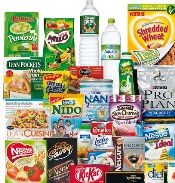 Some of the country's leading FMCG companies they include Nestle, Coca-Cola and Tata Coffee - are investing over Rs 1,800 crore (Rs 18 billion) in the next few months to expand capacity or for inorganic growth.
Some of the country's leading FMCG companies they include Nestle, Coca-Cola and Tata Coffee - are investing over Rs 1,800 crore (Rs 18 billion) in the next few months to expand capacity or for inorganic growth.
Nestle India is investing Rs 950 crore (Rs 9.5 billion) to set up two units to manufacture instant noodles and infant foods in Karnataka and Haryana.
The Karnataka unit will be up and running in the first quarter of next calendar year, while the Haryana unit will begin commercial production by the end of next of next calendar year.
It also plans a fifth facility to manufacture instant noodles, which will be put up for approval in the next two months.
Confirming the development, a Nestle India spokesperson said: "The new facilities will support and grow our business in these segments, where we require more capacity. We already have three units to manufacture instant noodles in Punjab, Uttarakhand and Goa." Nestle has decided to concentrate on culinary, dairy and beverage products as key areas of growth in the future.
Nestle has also announced the setting up of a research & development centre at Manesar at an investment of Rs 230 crore (Rs 2.3 billion).
The R&D centre - its 13th worldwide - will develop products specifically aimed at the Indian market.
Beverage major Coca-Cola India is investing Rs 550 crore (Rs 5.5 billion) to set up a greenfield beverage plant in Yadgir district of northern Karnataka.
Sources in the company say it currently does not have any plant in this region, as a result of which it has to be served by bottling plants in Hospet and near Bangalore.
However, these bottling plants also service Tamil Nadu and parts of Kerala.
"So, we found that there was a need to set up a third plant to serve the market well," said a source. Karnataka is the largest market for beverage companies, followed by Andhra Pradesh.
Tata Coffee, as part of its ambition to become a global plantation company, is scouting for coffee plantations in Uganda, Zambia, Ethiopia and Laos.
The aim is to ensure that 40 per cent of the company's topline comes from inorganic growth by 2015. If everything goes to plan, around 30 per cent of the company's coffee production will come from overseas plantations.
Speaking to Business Standard, Hameed Huq, managing director of Tata Coffee, said: "Expansion of coffee plantations in India is difficult as land is very expensive. That is why we are looking for Arabica coffee plantations or of land overseas, especially near the equator, which is best suited to growing coffee."
Huq says the investment on buying a plantation in these foreign locations is at least 50-60 per cent cheaper than in India.
The expansion of its coffee plantation is part of a major restructuring that Tata's food and beverage business. The group has already renamed Tata Tea as Tata Global Beverages and its headquarters shifted to London.
The focus will now be on different kinds of beverages and not limited to tea. Tata has also tied the knot in a joint venture with PepsiCo for affordable beverages.






